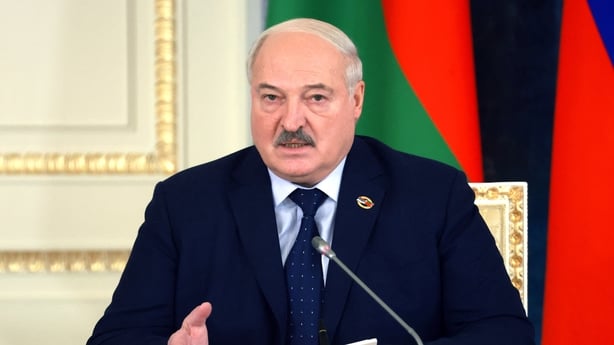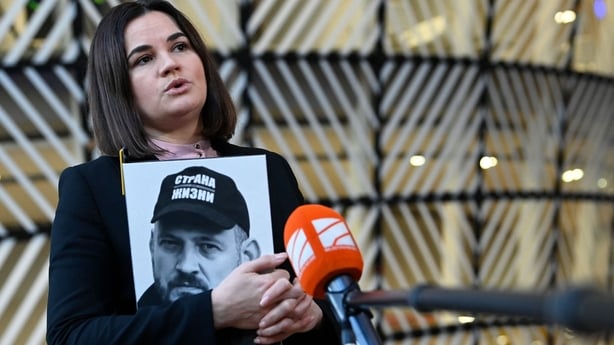Exiled Belarusian opposition leader Sviatlana Tsikhanouskaya refuses to describe the vote that took place in Belarus on Sunday as an election.
Speaking to Prime Time, she said the local and parliamentary votes were a "farce", an "imitation", a "ritual" but definitely not an election.
"It is not for people, it is not for country, it is not for law-making, because it is lawlessness in our country. It is only for Lukashenko and his cronies."
Having run in the 2020 presidential election against Belarus's long-term dictator, Aleksandr Lukashenko, Ms Tsikhanouskaya is now his key political opponent. She lives in exile in Lithuania, and leads an alternative Belarusian government council which campaigns internationally for democratic elections in what is Europe’s only remaining dictatorship.
Ms Tsikhanouskaya has life-long connections to Ireland, from spent time in north Tipperary as a child as part of a programme for children from radiation-affected areas linked to the Chernobyl nuclear disaster.
Last May, she collected the Tipperary International Peace Award.
The #Belarus regime's so-called elections today fail to meet any democratic standards, resembling more a military operation against its own citizens, the constitution & common sense. I urge Belarusians & the international community to categorically reject this sham. pic.twitter.com/oPDqDvvQpQ
— Sviatlana Tsikhanouskaya (@Tsihanouskaya) February 25, 2024
Only candidates loyal to Lukashenko were allowed to stand in Sunday's election. Most of them belong to the four officially registered parties, which all support his policies.
In an effort to offer an alternative message, Ms Tsikhanouskaya and her pro-democracy movement employed artificial intelligence tools.
"Since no independent candidate registered, we launched a virtual candidate," Ms Tsikhanouskaya told Prime Time.
The virtual candidate 'Yas Gaspadar’ was launched in the run-up to the election as part of an information campaign.
‘Mr Gaspadar’, an artificial intelligence character driven by ChatGPT, was part of the election campaign but did not feature on the ballot paper. In a country where media is tightly restricted and censorship is routine, ‘he’ allowed Ms Tsikhanouskaya’s pro-democracy movement in exile to "communicate to people inside the country, explaining our program, answering questions."
Gaspadar's creators, which include other Belarusian pro-democracy advocates, said 'his’ campaign focused on the release of political prisoners, the adoption of a new constitution, a ban on the import of nuclear weapons as well as free elections.
For people living in Belarus who face strict penalties for opposing Lukashenko's regime, it was a "safe tool to communicate [our message]," says Ms Tsikhanouskaya.
"This AI chatbot could talk to people safely, sharing ideas, answering questions, without the danger of getting people in trouble. The idea was to reach people inside Belarus safely, spread the messages of democracy and support for change without any fear of arrest."
"If they talk to me, if they watch alternative media, if they comment in different Telegram channels, they can be easily imprisoned. This is our reality."
Asking a chatbot for information about elections or political prisoners, however, is not a crime. "At least not yet," Ms Tsikhanouskaya says.
"[It] shows a new way to fight [for] democracy without putting people at risk. This is our main challenge at the moment."
Dictators like Aleksandr Lukashenko are also learning, she says, but she believes not as fast as she and her pro-democracy movement.
"Of course, we have to be always step ahead of the regime. Of course there will be reaction on this. They might forbid ChatGPT or, I don't know, some more instruments of artificial intelligence."

Crucial to this new phase in the information war against Lukashenko will be tech companies, says Ms Tsikhanouskaya.
"I think that IT companies in this cyberspace, cyber companies have to understand the importance in the fight against dictatorship, and they have to feel their responsibility as well."
"In such very limited environment, we have to be creative to reach people inside the country and not put them in danger."
"By using technology creatively, the opposition can keep fighting for freedom and democracy, even from afar. And this strategy could help bring about change by keeping the conversation going and encouraging people to stand up for their rights in a safe way."
There is a yearning for real information in Belarus, despite the strict rules against "extremist" media, Ms Tsikhanouskaya told Prime Time.
"They [Belarusians] don't want to be brainwashed, they want to know truth... to travel to see how other countries live. They don't want to believe the propaganda," she told Prime Time.
"I feel this unity. I feel that people are interested in knowing real news, and also in participating in political life. [But] Yes, underground - at the moment - because it's impossible to do something very visible without any risk."
Fighting an information war is one part of the struggle for democracy in Belarus, a country that, according to the US government, currently holds 1,500 political prisoners, including Ms Tsikhanouskaya's husband.
Sergei Tsikhanousky, also a pro-democracy activist, was arrested and imprisoned in 2020 when he announced his intention to contest the election in opposition to the rule of Lukashenko.

With the recent death of Russian President Vladmir Putin’s imprisoned opponent Alexei Navalny, Ms Tsikhanouskaya is concerned that other dictators will be emboldened to kill imprisoned political opponents.
"They might think that they can kill their political opponents without any consequences," she told Prime Time.
On a personal level, as an exiled opposition leader and with her husband in prison, she said when she heard of Mr Navalny’s death, she "felt awful."
"My husband and thousands of other political prisoners, they are also dying in prisons. They're being murdered. It's slowly, slow death behind the bars," she said.
"I think that [the] democratic world has to respond very firmly on this [Mr Navalny’s] murder, because it might be a green light or red line for further murders."
"For years, I'm scared but it looks like regimes are testing their limits, their red lines," she said.
In relation to the war in Ukraine, which has now entered its third year, Ms Tsikhanouskaya says she often hears people talk about "fatigue."
"We are feeling fatigue of this fatigue already. Tell about fatigue to people behind bars, who are going through everyday tortures... tell about fatigue to soldiers in cold trenches."
Every person has a moral obligation, she says, to help those who are fighting against dictatorship, as "enemies, these dictators, these tyrants can knock to your doors very soon."
Whether it’s fighting Russia on the battlefield or engaging in an information war against Lukashenko via a chatbot, Ms Tsikhanouskaya says it can’t be done alone.
"We have to be creative, we have to be inventive. We have to be non-conventional in this fight."







